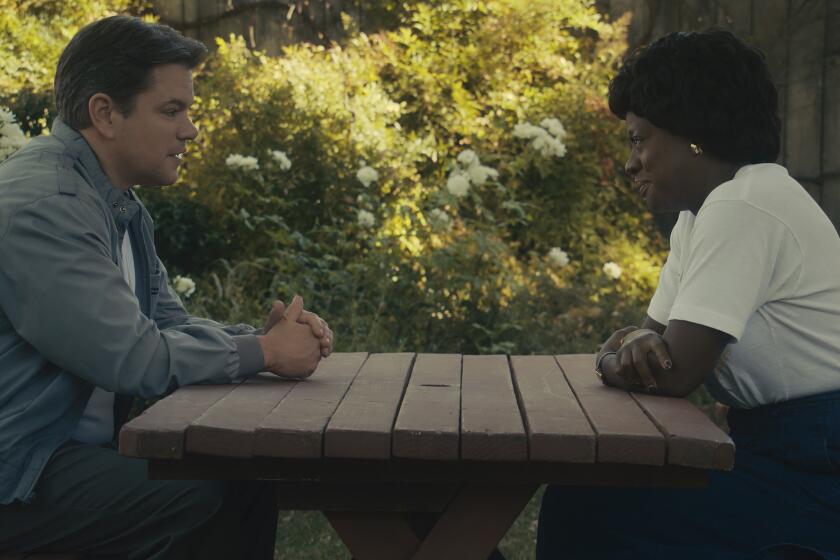Review: Troubled genius meets troubling system in Thelonious Monk doc ‘Rewind & Play’

- Share via
Troubled genius meets troubling system in the revealing, palpably tense archival documentary “Rewind & Play” from Senegalese French filmmaker Alain Gomis (“Félicité”). While doing research for a possible dramatic biopic about Thelonious Monk, Gomis made an extraordinary find: the unseen and unsettling parts of an interview the music legend did for a French documentary that aired in 1970.
In December 1969, Monk, by then a recognized game-changer and lauded artist, was in the City of Lights for a concert that would become a celebrated late performance at a time of declining health and his increasing retreat from the world. But before that, he sat down at a studio Steinway, its lid removed, for a 30-minute program called “Jazz Portraits,” to be hosted on camera by co-director Henri Renaud, himself a jazz pianist, admitted fan and occasional acquaintance.
Ben Affleck’s first directorial effort since ‘Live by Night’ stars Matt Damon as the Nike basketball guru who spearheaded a landmark celebrity endorsement deal.
What transpired, though, was a discomfortingly awkward interview that would eventually be excised before broadcast, leaving only Renaud’s superficial biographical narration to “speak” for the sweating, wary-looking Monk between his rapturous solo performances, which include “Round Midnight,” “Crepuscule With Nellie” and “Ugly Beauty.” Behind that packaging decision, though, which we can now see thanks to the footage Gomis re-edits back in, is the laid-bare reality of a power imbalance — a Black artist’s attempt to tell his story being overridden by a white gatekeeper’s preference for his own self-congratulatory, polished framing.
At the heart of this is an exchange prompted by Renaud, leaning on the piano, as he recalls meeting Monk in New York in 1954 and arranging for him to play at that year’s Paris Jazz Festival. Monk counters that foregrounding of Renaud’s experience with his own, specifically the difficulties making that gig work despite learning all too late that he was the face of the festival — he got no help finding musicians and was paid less than everybody else.

Renaud wants the answer taken out, calling it “derogatory.” Monk keeps trying to tell it, though, to the point of getting up to leave when he gets pushback, clearly reliving the exploitation. “It’s no secret, is it?” Monk says. Renaud responds, “No, but it’s not nice.” Gomis spotlights this moment’s aura of condescension and disrespect by giving “Rewind & Play” the cheeky subtitle, which was also Monk’s retort, “It’s Not Nice?” (Monk makes his own nonverbal commentary about his interviewer later, when Renaud asks for one more mid-tempo number. Monk chooses “Nice Work If You Can Get It.”)
At a little over an hour, which includes nonstudio footage before the taping of Monk in a bar smoking and petting someone’s dog, “Rewind & Play” is plenty disquieting in the sausage-making aspects of a TV documentary looking for what’s safe and palatable in centering a famously erratic, misunderstood Black musician. But the film is also marked by a tonal opposite when Monk plays: the rhythmic, harmonic brilliance of his work in full flight, even as the isolating setting gives the performances the feeling of a release valve, and perhaps at the same time, one more turn inward.
Monk once famously asserted that there were no wrong notes on the piano, a statement that was, by extension, a defense of his considerable body of compositions — now an essential lexicon for modern jazz. Key to the impact of a gripping historical correction like “Rewind & Play” is that where Monk’s art relished asymmetrical, free expression — what’s simultaneously playful and wrenching in life — Renaud felt he had to avert and suppress to promote his own appreciation of it, creating a space where improvisation meant nothing.
But thankfully, in the stretches when Monk is playing, he gets to be exactly who he is, his exhilarating music doing the talking, his exquisite dissonance suddenly more revelatory than perhaps intended.
'Rewind & Play'
In French and English with English subtitles
Not rated
Running time: 1 hour, 5 minutes
Playing: Lumiere Cinema at the Music Hall
More to Read
Only good movies
Get the Indie Focus newsletter, Mark Olsen's weekly guide to the world of cinema.
You may occasionally receive promotional content from the Los Angeles Times.











